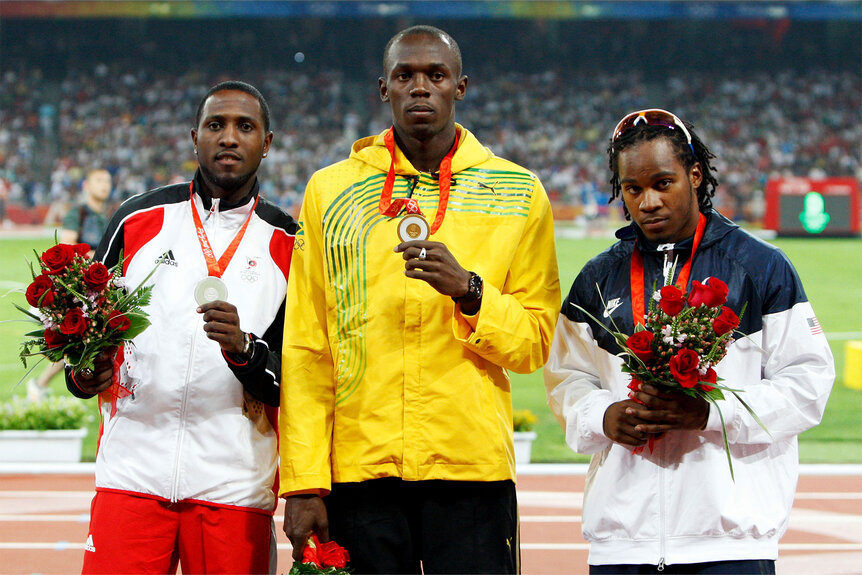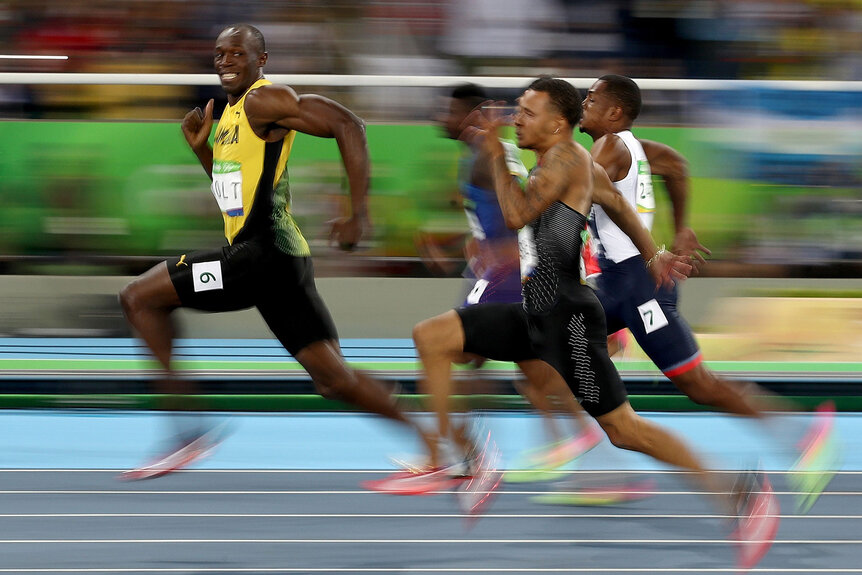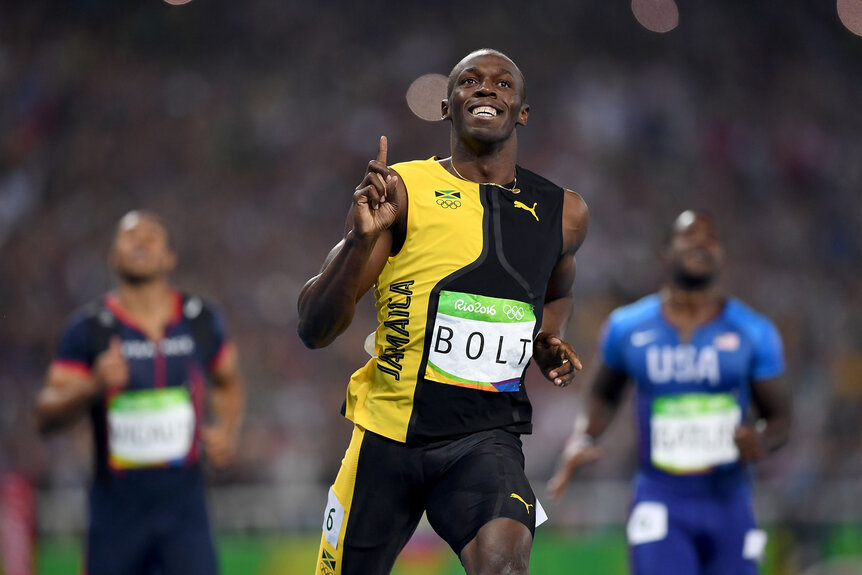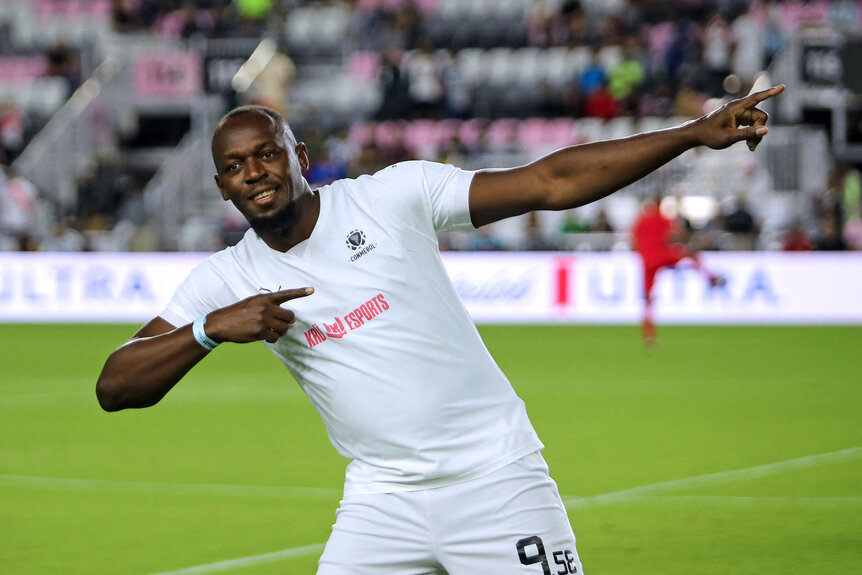Create a free profile to get unlimited access to exclusive show news, updates, and more!
Olympic Sprinter Usain Bolt Is Inspiring a New Generation of Athletes: "Anything Is Possible"
In addition to playing professional soccer, the fastest man alive and eight-time gold medalist has steadily been making strides to positively impact his native country of Jamaica.

In the universal realm of sport, there are stars, and then there are supernovas. That said, there’s still only one Usain St. Leo Bolt.
Born August 21, 1986, in Sherwood Content, Jamaica, Bolt gravitated to athletic competition, but not in the traditional track and field realm for which he became a record-smashing legend. His first loves were cricket and soccer, and had it not been for his youth coaches at William Knibb Memorial High School suggesting that the lanky kid with a big heart, undeniable charm, and infectious humor try his hand at sprinting, the world would unequivocally be a sadder place as the electrifying athlete has shown he’s not just a titan in his field and an all-time Olympic great, like Bob Marley, he’s also a hero to all those in the Jamaican communities he’s on a mission to uplift.
For more on the Olympics:
Kelly Clarkson, Peyton Manning, and Mike Tirico Will Host the 2024 Olympics Opening Ceremony
Sprinter Michael Johnson Continues to Inspire Others After Making Olympic History
Snoop Dogg Dancing with His Little Granddaughters in His Studio Is Too Cute for Words
Usain Bolt's Medals and Records
Standing at a staggering six-feet, five-inches, one would think that Usain Bolt fits better alongside the Golden State Warriors’ point guard Stephen Curry, not dominating the world’s best sprinters on his way to capturing eight gold medals. But the truth is often stranger than fiction, and Bolt never let his paradoxical frame — one that confounded pundits and paralyzed the competition — ever deter him from achieving greatness.
While his first Games in Athens, Greece did not produce any accolades for the emerging phenom due to a nagging hamstring injury, the 2008 Olympic stage in Beijing, China was an entirely different story. With the goal of emulating former Team USA Olympic great Carl Lewis and fueled by critics who labeled him as lazy, Bolt stunned the world, earning gold medals in both the 100m and 200m race, but that only painted part of the picture. The lean machine with an idiosyncratic style not only won the 100m with a shoe untied, he accomplished what many proclaimed to be the impossible: in the process of torching the competition in the 200m on his 22nd birthday, he also beat Michael Johnson’s iconic record of 19.32 seconds by two hundredths that the American, golden-booted sprinter set at the 1996 Olympic Games in Atlanta, Georgia. Forget the Sweet n’ Sour sauce — those 100 McDonald’s chicken nuggets per day in Beijing provided him all the mojo a growing champion needed.
Though Bolt earned an additional gold in the 4x100m relay in Beijing, which was later vacated in 2017, following a retest of his teammate’s Nesta Carter’s blood that revealed a banned substance, Bolt defended his reign by capturing a trifecta of gold medals – the 100m, the 200m and 4x100m relay — at the 2012 Games in London and the 2016 Games in Rio. The history books will forever shine brightly on Bolt as he’s the only athlete to ever win the 100m and 200m in three consecutive Olympiads, and his 100m record of 9.58 seconds he set in 2009 — a race in which he eclipsed 27.5 miles per hour — still stands, making him truly the fastest human on the planet.
Why did Usain Bolt retire from Olympic competition?
Having suffered hamstring injuries early in his career before his first Games in Athens, Greece, the impact of those debilitating traumas is what ultimately curtailed Usain Bolt from making it into future Olympic Games. Coupled with lingering back issues that stem from the chronic stress his six-foot-five frame endured over the course of his career, the Jamaican legend officially retired from competitive sprinting after he pulled up early in the 4x100m relay event with another hamstring injury during the 2017 World Championships. Despite only being 30 years old, when it comes to Olympic sprinters, it takes a lot to gear up and refuel the tank, and according to Sports Illustrated, Bolt was never a big fan of the intense training that went into making him great and was finally able to put that part of his career behind him. In an era where doping from his peers tarnished his sport, the brilliance behind Bolt’s dominant performances cannot be overstated.
Usain Bolt's Soccer Career
There’s nothing that tops seeing your dreams come to fruition, and for Usain Bolt, who had long desired since childhood to play soccer at an elite level, Bolt made his pro debut in 2018 with the Central Coast Mariners in the A-League, Australia’s top flight. Though he’s a diehard fan of Manchester United, he worked out for Borussia Dortmund in Germany’s top flight, even scoring with a header, but the Bundesliga heavyweights did not offer him a contract, and when negotiations with the Mariners broke down, according to Sports Illustrated, he walked away from further chasing down his first love of sports.
“I don’t want to say it wasn’t dealt with properly, but I think we went about it, not the way we should," Bolt revealed, per SI’s reporting. "You learn your lesson, you live and you learn.”
He continued, “It was a good experience. I really enjoyed just being in a team, and it was much different from track and field, and it was fun while it lasted.”
Though he was not able to convert his trial opportunities into any meaningful long-term contracts, he converted twice on the pitch in a pre-season friendly during his time with the Mariners down under.
RELATED: Michael Phelps Welcomes Newborn with Wife Nicole, Shares Cute Pic of Their 4 Boys
Television and Media Appearances
Considering the prolific nature of Usain Bolt’s career on the track, it should come as no surprise that the fastest man in the earthly realm has been featured in every daytime and nighttime talk show under the sun, but he’s also been the subject of several documentaries and docuseries. According to IMDB, he’s appeared alongside the Argentinian talisman Lionel Messi in Goat Camp (2020) and worked with LeBron James, Tom Brady, Marcus Rashford, Russell Wilson and Lindsey Vonn in Greatness Code (2020). He also produced the Gatorade-distributed, animated short film The Boy Who Learned to Fly (2016), which delves into Bolt’s life prior to his success on the track. Bolt even made a cameo appearance with Jason Sudeikis on Saturday Night Live (2012), participating in a hilarious parody debate between Joe Biden and Paul Ryan (jump to minute 7:20 for that gem), and he provided a priceless new character on the tried-and-true “Californians” sketch, where he lit up the screen with bleach-blonde hair and a version of the signature Cali accent you don’t want to miss.
What is Usain Bolt doing now?
It’s difficult to imagine that there will ever be another Olympic sprinter like Usain Bolt, but as bold of a legacy as he leaves behind on the track, since retiring from all athletic competitions, his life’s mission has now turned to inspiring youth athletes in his native country of Jamaica. The man whose striking pose of a lightning bolt that would make even Zeus jealous is confident that he can be a vital ambassador for the sport.
"I'm still waiting on a position from [World Athletics], I've reached out to them and let them know I would love to make a bigger impact in sports, as long as they want me to,” Bolt mentioned to Reuters in May of last year. "It's going to be a process. After me, it kind of went down because of who I was as a person, and how big my personality was.”
"But I think over time it will be better,” continued the charismatic Olympic legend. “I think young athletes are coming up, and I see a few personalities that are needed in sport, hopefully in the upcoming years it will change. Hopefully I can play a part and help the sport to grow."
But inspiring the future generations is only part of how Bolt is ensuring he makes a lasting impact on the world. Through his philanthropic enterprise, The Usain Bolt Foundation, the eight-time gold medalist, who shares three children with his longtime girlfriend Kasi Bennett, is creating “opportunities through education and cultural development for a positive change” for the enrichment of children’s lives all across Jamaica. He has partnered with Epson to provide printers to several primary schools throughout his homeland as well as participating in a separate initiative to give 150 laptop computers to students in rural Jamaica. With the help of his friend and billionaire mogul Richard Branson, Bolt helped launch the Caribbean Climate-Smart Accelerator as its ambassador, aiming to make 26 countries in the region, which covers one million square miles and supports more than 40 million people, the world’s first climate-smart zone, according to the World Bank. He’s even producing songs, like “Cryptic World,” that aim to address and tackle the many social issues that Jamaica faces.
In attending the Expo 2020 Dubai, Bolt spoke to CNN’s Becky Anderson about also his critically important work with special needs athletes.
“For me, it’s just all about to show determination, and for me, to see them go out there and work as hard as they do, it also inspires me to know that they have this disability, but they never give up.” Bolt said. “They want to be great athletes as well.”
He added, “For me, it’s just to leave a legacy to prove to people that anything is possible.”






